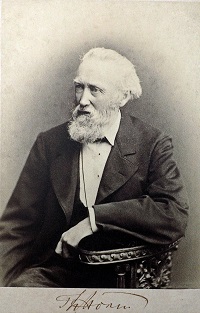This novella, first published in 1888, was the final and arguably the finest work by German writer, Theodor Storm. Combining both realism and the supernatural, The Rider on the White Horse is full of symbolism and superstition. Here, humankind must battle against the forces of nature, a struggle embodied by the image of the phantom-like rider and his white horse galloping into the waves. This is a tale of a man from the North German fenlands who tries to tame not only the natural world but also the reactionary ideas and ingrained superstitions of his neighbors. Storm uses narrative framing, stories within stories, to move across time and conventional boundaries to explore different aspects of how we see ourselves, each other, and our relationship with our environment. The main narrative focuses on Hauke Haien, his dramatic encounters with the sea and his obsessive mission to protect the low-lying land, a quest that leads him into the realm of science and mathematics. There is a sense that superstition is under scrutiny by reason, yet an underlying uneasiness remains in the imagery that permeates the text: the incessant screaming and shrieking of the gulls, the roar of the waves, the constant reference to eyes with the "burning eyes" of the white-horse rider, and the inquiring gaze of the old schoolteacher. Nature is portrayed as wild, unpredictable, and disconcerting, while the community is always mindful of its destructive powers.
"Just as most American school children are familiar with Washington Irving s The Legend of Sleepy Hollow , their German counterparts know The Rider on the White Horse . It is a German literary landmark and remains one of the great ghost stories, never to be forgotten and never losing its ability to terrorise. Not because it is obviously creepy, but because its slow, subtle, nuanced telling lingers through a balanced mix of logic and the inevitable...This quiet Frisian who wrote his stories while serving the law is the literary equivalent of the artist Caspar David Friedrich. Storm s melancholy fiction exerts the haunting power of German romanticism as well as an understanding of the choices made and decisions lamented." --Irish Times
" 'German short fiction of the 19th century' may sound like the title for a college course...In fact, the stories of Ludwig Tieck , E.T.A. Hoffmann, and Heinrich von Kleist are among the glories of world literature, being at once suspenseful, eerie and sometimes humorous, albeit usually in a macabre way. Many of these 19th-century Novellen, as they are called, are clearly related to fairy tale and legend. Arguably the greatest of them all is 'The Rider on the White Horse'....While [it] represents Theodor Storm as a writer of prose, he is equally revered as one of Germany's finest lyric poets. So it seems right that the material in this handsome reissue... should have been translated by the poet James Wright, who also contributes a superb introduction." --Michael Dirda, The Washington Post
Like Theodor Fontane's Effi Briest, Storm's book combines a story of societal pressures with a touch of the supernatural...There is plenty of eerie Germanic mood here, but there is also a fine and tragic story of a man who follows his own path to its final, terrible end and people who fail to recognize sacrifice. Publishers Weekly
"A new translation of a famous 1888 novella...This is a marvelous work, effortlessly lifted to eerie supernatural heights...Storm's mastery of the details of dyke-building and bourgeois political intrigue ground it firmly in recognizable reality. There is nothing better in German fiction prior to the work of Thomas Mann." Kirkus Reviews
"Theodor Storm, master of the 19th-century novella." The Spectator
"Written in 1888, the story is set along Germany's North Sea coast which Storm, as a native Schleswig Holsteiner, knew and loved, and is a powerful, tragic tale of man's battle with the elements - in this case, the sea - and of an individual at odds with the narrow society around him. The almost visionary evocation of nature, and the vivid word painting of this region of dykes and polders and vast mud flats, are the key to this classic short novel by a man who was also a distinguished poet." The Irish Times
Storm is a writer for whom most lovers of German literature have a soft spot. He is a master of atmosphere, unique in his ability to endow the details of realistic description with the fragile aura of transience precisely because they are so vividly captured. A Companion to German Literature
"This fine new translation of Storm's 'Der Schimmelreiter' first published in 1888, when it was immediately recognised as a masterpiece of romantic idealism. Its setting is the eerie coast of North Friesland, vulnerable to frightening storms and under perpetual threat from the sea; its eighteenth-century hero, the dykemaster, builds new and better defenses, but his battle against the forces of nature stands also for another battle, against the bigoted fundamentalism of hostile villagers. In accordance with the genre, of which this is a brilliant example, the plot includes a suitably creepy ghost storm." Sunday Telegraph
"Translations of the high standard as this one are more than ever in demand." Mary Garland, editor of The Oxford Companion to German Literature
"This is an excellent...translation." Independent on Sunday
" 'German short fiction of the 19th century' may sound like the title for a college course...In fact, the stories of Ludwig Tieck , E.T.A. Hoffmann, and Heinrich von Kleist are among the glories of world literature, being at once suspenseful, eerie and sometimes humorous, albeit usually in a macabre way. Many of these 19th-century Novellen, as they are called, are clearly related to fairy tale and legend. Arguably the greatest of them all is 'The Rider on the White Horse'....While [it] represents Theodor Storm as a writer of prose, he is equally revered as one of Germany's finest lyric poets. So it seems right that the material in this handsome reissue... should have been translated by the poet James Wright, who also contributes a superb introduction." --Michael Dirda, The Washington Post
Like Theodor Fontane's Effi Briest, Storm's book combines a story of societal pressures with a touch of the supernatural...There is plenty of eerie Germanic mood here, but there is also a fine and tragic story of a man who follows his own path to its final, terrible end and people who fail to recognize sacrifice. Publishers Weekly
"A new translation of a famous 1888 novella...This is a marvelous work, effortlessly lifted to eerie supernatural heights...Storm's mastery of the details of dyke-building and bourgeois political intrigue ground it firmly in recognizable reality. There is nothing better in German fiction prior to the work of Thomas Mann." Kirkus Reviews
"Theodor Storm, master of the 19th-century novella." The Spectator
"Written in 1888, the story is set along Germany's North Sea coast which Storm, as a native Schleswig Holsteiner, knew and loved, and is a powerful, tragic tale of man's battle with the elements - in this case, the sea - and of an individual at odds with the narrow society around him. The almost visionary evocation of nature, and the vivid word painting of this region of dykes and polders and vast mud flats, are the key to this classic short novel by a man who was also a distinguished poet." The Irish Times
Storm is a writer for whom most lovers of German literature have a soft spot. He is a master of atmosphere, unique in his ability to endow the details of realistic description with the fragile aura of transience precisely because they are so vividly captured. A Companion to German Literature
"This fine new translation of Storm's 'Der Schimmelreiter' first published in 1888, when it was immediately recognised as a masterpiece of romantic idealism. Its setting is the eerie coast of North Friesland, vulnerable to frightening storms and under perpetual threat from the sea; its eighteenth-century hero, the dykemaster, builds new and better defenses, but his battle against the forces of nature stands also for another battle, against the bigoted fundamentalism of hostile villagers. In accordance with the genre, of which this is a brilliant example, the plot includes a suitably creepy ghost storm." Sunday Telegraph
"Translations of the high standard as this one are more than ever in demand." Mary Garland, editor of The Oxford Companion to German Literature
"This is an excellent...translation." Independent on Sunday









